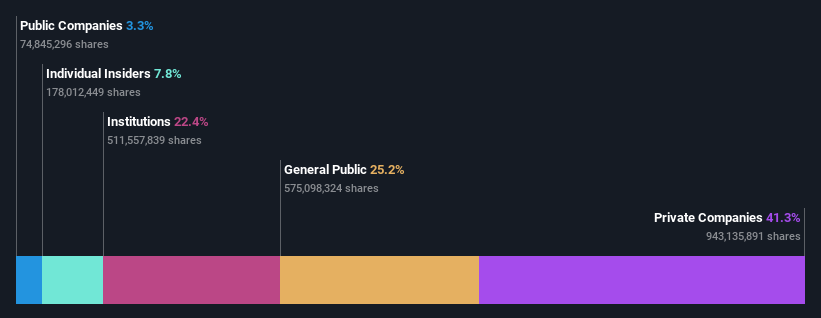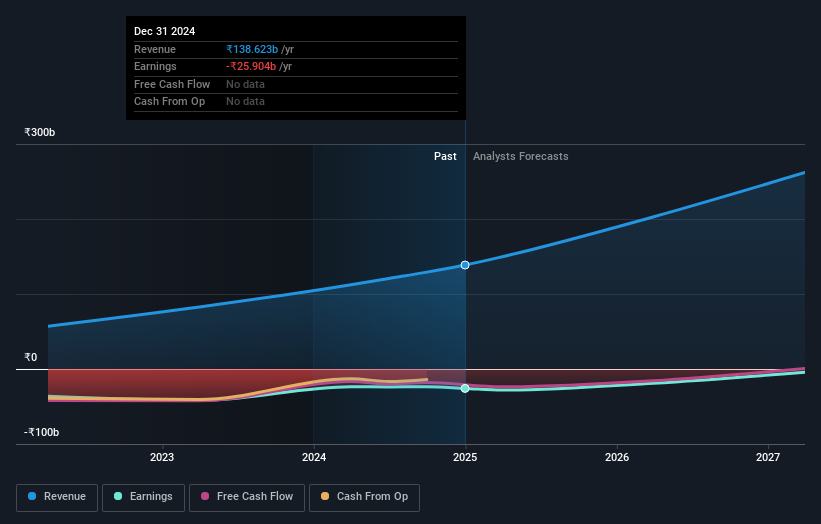- India
- /
- Hospitality
- /
- NSEI:SWIGGY
Private companies are Swiggy Limited's (NSE:SWIGGY) biggest owners and were hit after market cap dropped ₹47b

Key Insights
- The considerable ownership by private companies in Swiggy indicates that they collectively have a greater say in management and business strategy
- 51% of the business is held by the top 7 shareholders
- Institutional ownership in Swiggy is 22%
Every investor in Swiggy Limited (NSE:SWIGGY) should be aware of the most powerful shareholder groups. We can see that private companies own the lion's share in the company with 41% ownership. That is, the group stands to benefit the most if the stock rises (or lose the most if there is a downturn).
And last week, private companies endured the biggest losses as the stock fell by 5.8%.
Let's take a closer look to see what the different types of shareholders can tell us about Swiggy.
See our latest analysis for Swiggy

What Does The Institutional Ownership Tell Us About Swiggy?
Many institutions measure their performance against an index that approximates the local market. So they usually pay more attention to companies that are included in major indices.
We can see that Swiggy does have institutional investors; and they hold a good portion of the company's stock. This can indicate that the company has a certain degree of credibility in the investment community. However, it is best to be wary of relying on the supposed validation that comes with institutional investors. They too, get it wrong sometimes. When multiple institutions own a stock, there's always a risk that they are in a 'crowded trade'. When such a trade goes wrong, multiple parties may compete to sell stock fast. This risk is higher in a company without a history of growth. You can see Swiggy's historic earnings and revenue below, but keep in mind there's always more to the story.

Swiggy is not owned by hedge funds. Looking at our data, we can see that the largest shareholder is Mih India Food Holdings B.V. with 25% of shares outstanding. With 7.6% and 4.8% of the shares outstanding respectively, SVF II Songbird (De) LLC and Sriharsha Majety are the second and third largest shareholders. Sriharsha Majety, who is the third-largest shareholder, also happens to hold the title of Member of the Board of Directors.
We did some more digging and found that 7 of the top shareholders account for roughly 51% of the register, implying that along with larger shareholders, there are a few smaller shareholders, thereby balancing out each others interests somewhat.
While studying institutional ownership for a company can add value to your research, it is also a good practice to research analyst recommendations to get a deeper understand of a stock's expected performance. There are a reasonable number of analysts covering the stock, so it might be useful to find out their aggregate view on the future.
Insider Ownership Of Swiggy
The definition of an insider can differ slightly between different countries, but members of the board of directors always count. The company management answer to the board and the latter should represent the interests of shareholders. Notably, sometimes top-level managers are on the board themselves.
I generally consider insider ownership to be a good thing. However, on some occasions it makes it more difficult for other shareholders to hold the board accountable for decisions.
We can see that insiders own shares in Swiggy Limited. It is a very large company, and board members collectively own ₹59b worth of shares (at current prices). Most would say this shows a good alignment of interests between shareholders and the board. Still, it might be worth checking if those insiders have been selling.
General Public Ownership
The general public-- including retail investors -- own 25% stake in the company, and hence can't easily be ignored. This size of ownership, while considerable, may not be enough to change company policy if the decision is not in sync with other large shareholders.
Private Company Ownership
We can see that Private Companies own 41%, of the shares on issue. It's hard to draw any conclusions from this fact alone, so its worth looking into who owns those private companies. Sometimes insiders or other related parties have an interest in shares in a public company through a separate private company.
Public Company Ownership
We can see that public companies hold 3.3% of the Swiggy shares on issue. This may be a strategic interest and the two companies may have related business interests. It could be that they have de-merged. This holding is probably worth investigating further.
Next Steps:
It's always worth thinking about the different groups who own shares in a company. But to understand Swiggy better, we need to consider many other factors. Take risks for example - Swiggy has 1 warning sign we think you should be aware of.
But ultimately it is the future, not the past, that will determine how well the owners of this business will do. Therefore we think it advisable to take a look at this free report showing whether analysts are predicting a brighter future.
NB: Figures in this article are calculated using data from the last twelve months, which refer to the 12-month period ending on the last date of the month the financial statement is dated. This may not be consistent with full year annual report figures.
New: Manage All Your Stock Portfolios in One Place
We've created the ultimate portfolio companion for stock investors, and it's free.
• Connect an unlimited number of Portfolios and see your total in one currency
• Be alerted to new Warning Signs or Risks via email or mobile
• Track the Fair Value of your stocks
Have feedback on this article? Concerned about the content? Get in touch with us directly. Alternatively, email editorial-team (at) simplywallst.com.
This article by Simply Wall St is general in nature. We provide commentary based on historical data and analyst forecasts only using an unbiased methodology and our articles are not intended to be financial advice. It does not constitute a recommendation to buy or sell any stock, and does not take account of your objectives, or your financial situation. We aim to bring you long-term focused analysis driven by fundamental data. Note that our analysis may not factor in the latest price-sensitive company announcements or qualitative material. Simply Wall St has no position in any stocks mentioned.
About NSEI:SWIGGY
Swiggy
Operates Swiggy, a platform to browse, select, order, and pay for food delivery in India.
High growth potential with excellent balance sheet.
Similar Companies
Market Insights
Community Narratives



